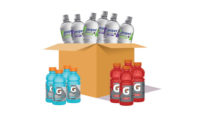As one of the most memorable fictional inventors, “Doc” Brown (played by Christopher Lloyd) created a time machine from a DeLorean car in the classic 1985 film “Back to the Future.” When terrorists arrive and attack Doc, his pal Marty McFly (Michael J. Fox) uses the time machine to save his friend and even improve the lives of his family members ― though not without its challenges. In the real world, with no time machines to help people improve their lives, technology still is playing an ever-growing role in making day-to-day experiences less complicated.
As more consumers embraced eCommerce shopping in regards to consumable products, alcohol delivery also has ramped up in recent years. However, these platforms have mainly operated through local retailers. Moreover, despite growing interest in this shopping platform, purchasing alcohol products through direct-to-consumer (DTC) methods have remained limited, experts note.
“Rapidly evolving expectations of consumers are driving intensified interest in direct-to-consumer shipping,” says Chris Swonger, president and CEO of the Distilled Spirits Council of the United States (DISCUS). “This includes the desire of consumers to obtain limited-release products, club offerings or to ship products home from a distillery visit. We know the world of commerce is changing dramatically and spirits direct-to-consumer shipping would modernize the marketplace to meet consumer demands.”
A report released earlier this year from SOVOS ShipCompliant in association with the Brewers Association titled “2023 Direct to Consumer Beer Shipping Report,” also highlights consumer interest for DTC and craft beer. The report found that 79% of regular craft beer drinkers indicated they’re likely to purchase craft beer through DTC shipping in the future and 37% stating they are very likely to.
Despite this interest only 11 states as well as Washington, D.C., permit DTC beer shipping, compared with 47 states as well as Washington, D.C., which permit DTC wine shipping.
DISCUS’s Swonger also notes the challenges that the spirits market has encountered when it comes to DTC access.
“Consumers buy nearly everything online ― from cars, to homes to wine. Unfortunately, they are unable to do the same in the vast majority of states for spirits. U.S. eCommerce sales increased sharply during the pandemic with a 131% increase in online alcohol sales from 2019-2021,” he explains citing Rabobank data. “Spirits accounted for $1.3 billion in total online alcohol sales in 2021 (Rabobank). Allowing direct-to-consumer shipping for spirits will help producers meet consumers where they are.”
Citing an IWSR survey commissioned by DISCUS, Swonger notes that 62% of adult consumers have bought beverage alcohol online.
“The pandemic increased the amount of people shopping online and made them more comfortable doing so,” he says. “Two-thirds of shoppers who buy alcohol online made their first purchase during the pandemic. Millennials were the most likely age group to purchase alcohol online (71%), but even 45% of baby boomers reported doing so.”
In the SOVOS ShipCompliant and Brewers Association report, it found that of regular craft beer drinkers who are likely to use DTC shipping, 37% were in the 21 to 34 age group, while 30% were in the 35 to 44 age group.

Supporting the system
Although interest from consumers in DTC remains high, concerns have been raised about how this could impact the established three-tier system in the United States for alcohol sales.
In the report, the Brewers Association Perspective pointed to tightened distribution access for craft brewers.
“The National Beer Wholesalers Beer Purchasers’ Index, a directional indictor of what wholesalers are buying, has showed beer wholesalers purchasing less craft in 11 of the 12 months of 2022,” the report states. “Scan data shows craft sales down in packaged format and distributed draught sales remain below 2019 levels.”
The Brewers Association Perspective notes that DTC shipping would allow craft brewers to bridge that gap, particularly for the small/micro brewers.
“Moving beyond consumer demand, in this competitive market environment, direct-to-consumer shipping is a critical channel for small brewers, both for the sales opportunities, as well as a channel to help demonstrate demand and gain access to further distribution opportunities. The vast majority of America’s craft brewers are very small — more than two-thirds made less than 1,000 barrels of beer in 2021,” the report states citing the Brewers Association’s data. “Direct-to-consumer shipping offers opportunities to sell beer at that scale.”
DISCUS’s Swonger meanwhile highlights the association’s support for the three-tier system, but notes that DTC shipping offers an opportunity to complement the three-tier system to meet consumer demand and grow the entire industry.
“Expanding distillers’ ability to direct ship will introduce consumers to new products that will eventually grow into brands carried by traditional wholesalers, thus strengthening the overall spirits industry and the three-tier system,” Swonger says. “DTC shipping serves as an onramp for small distillers by allowing tasting experiences and organic brand building ― creating a cost-effective way to generate the kind of product attention that is critical for partnering with wholesale distributors.
“Spirits direct-to-consumer shipping will grow the overall spirits industry, support the three-tier system and allow more adult consumers to be able to enjoy our great products,” he continues.
For instance, Swonger highlights that in states where DTC shipping currently is permitted, it provides source revenue for businesses as well as access to new consumers.
“In the last 15 years, growing consumer interest in diverse spirits products has led to the increase in the number of distilleries in the U.S. from just 70 to more than 2,600,” Swonger explains. “There are now more than 15,000 distilled spirits products in the marketplace. It’s not possible for retailers to carry every single product, so expanding distillers’ ability to direct ship spirits will help them reach consumers and introduce them to their new brands and line extensions.
“And the goal is that those brands will then grow into brands carried by traditional wholesalers, thus strengthening the spirits business and the three-tier system,” he continues.
Connecting and communicating
Despite the limitations on beverage alcohol for DTC shipping, non-alcohol beverages do not have the same regulation hurdles, but still are navigating this burgeoning sales market.
“Shipping is of course a big challenge for some brands as well as the shipping costs can be very high,” says Sharad Chadha, CEO of Sprecher Brewing Co., Glendale, Wis. “Also, the logistics of fulfillment can also be a challenge. Damaged goods are a problem for some items.”
Yet, with convenience, price and inflation all impacting consumer shopping habits, digital solutions like eCommerce and DTC are appealing to shoppers today.
“eCommerce has become a major presence for consumers and is continuing to grow in importance,” Chadha says. “I would say 20-40% and growing depending on the category and in some categories, it may be even higher.”
Noting how DTC allows consumers to save on time and money, Chadha prognosticates more opportunity for DTC to grow.
“DTC will certainly continue to grow, and consumers will continue to look for convenient ways to save time and money and DTC can help with both,” Chadha says. “I expect it to continue to grow at double digit rates.”
The other benefit that having a robust DTC division can offer a brand is better engagement with its consumers.
“Investing in DTC platforms is a great way to connect and communicate with your consumer and of course is another way to drive sales,” Chadha says. “These platforms are a great way to start a two-way conversation with consumers and learn more about them and their wants and needs as well as share relevant product information.”




